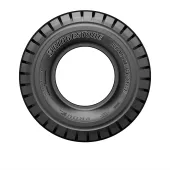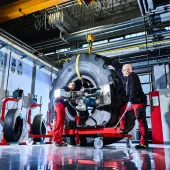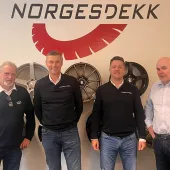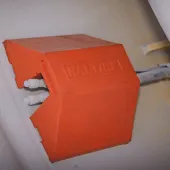Tyre Pressure Management

First published in the November 2013 issue of Quarry Management
Air-Seal Products Ltd highlight the dangers of under-inflation
One of the major factors affecting tyre safety is tyre pressure maintenance, ie keeping tyres at their optimum pressure for their full life cycle. One of the most cost-effective and safe ways to achieve this is through the use of high-grade tyre sealants, such as those supplied by Air-Seal Products Ltd. Their high-quality NATO-approved sealants are used around the world by the UN as well as by many high-profile quarrying and mining customers.
The main function of Air-Seal’s high-performance sealant is the prevention of under-inflation. The vast majority of under-inflation conditions are not caused by large punctures, but instead are the result of slow, insidious air loss that often goes unnoticed by the vehicle operator. The source of such air loss can be due to rubber porosity, very small punctures, valve-stem leaks or bead/ O-ring leaks. This type of under-inflation can and sometimes does lead to catastrophic failures, with obvious safety consequences.
The use of a sealant can drastically reduce incidences of under-inflation, with a commensurate reduction in expensive and dangerous blowouts and an improvement in safety. The repair itself will outlast the usable life of a tyre; it is simple to install, safe to use and has been independently tested. Even earthmover tyres that are protected by chains can benefit significantly from having a high-performance tyre sealant installed. By repairing slow air losses that result from small penetrations which manage to get past the chains, the frequency of chain removal and refitting — an expensive and time-consuming procedure — can be reduced.
An under-inflated tyre, regardless of its size and weight, is a tyre with not enough volumetric pressure to carry the weight and load of the machine. While operators will always know when they have a deflated tyre, they may not always know when they have under-inflated tyres. An under-inflated tyre will not maintain its shape and will become more distorted than intended, or designed, while in contact with any surface. If a vehicle’s tyres are continually run under-inflated this will inevitably lead to tyre failure. Additionally, the tyre’s tread life could be reduced by as much as 20–30%. Lower inflation pressure will allow the tyre to move more as it rolls, causing increased friction; this will generate unnecessary internal heat and increase rolling resistance, causing a reduction in fuel economy.
As mentioned, Air-Seal’s high-quality tyre sealants will eliminate tyre porosity and significantly reduce bead, valve and O-ring leaks, thereby helping to maintain the original inflation pressure. This, in turn, reduces the number of man hours expended on tyre maintenance, checking pressures and re-inflating ‘soft’ tyres. Maintaining the correct inflation pressure will allow the operator to experience the tyre comfort, durability and performance as originally designed to match the needs of the machine.
Tyre sealant: how it works
As the tyre rotates, the product spreads evenly over the inside surface. Immediately a puncture occurs, the air pressure in the tyre forces millions of fibres and fillers suspended in the sealant to interlock to form a plug which prevents any further air loss. The plugs are formed by aramid fibres snagging on the inside surfaces of a tyre wound. The wound itself flexes as it comes into contact with the road, allowing more fibres to enter it. This process is repeated as the tyre rotates until the wound has accepted the maximum amount of fibre.
Tangling and compaction of the fibres in the wound is maximized by the varied configurations of the aramid fibres. The inside end of the plug produces a broad ‘rivet head’ of fibres that are partially compacted in the plug shaft and partially free to ‘bush out’ to form a structure which prevents the plug from being ejected from the wound by air pressure. Moreover, the structure of the plug prevents it from dislodging for the life of the tyre, while the nature of aramid fibres ensures that the integrity of the plug does not deteriorate in service.
Aramid fibres are some of the strongest, most abrasion-resistant synthetic fibres. DuPont’s trade name for their aramid fibres is Kevlar, which is recognized as the material of choice for the construction for bullet-proof vests. The composition and configuration of the aramid fibres used in Air-Seal Products’ tyre sealant have been specifically chosen to ensure that the plugs formed in tyre punctures will last without failure for the life of the tyre in any service.
Air-Seal tyre sealants are non-combustible and fully compatible with the use of nitrogen for inflation, making them well suited for use in earthmover and other OTR tyres.
For further information visit: www.air-sealproducts.com
- Subscribe to Quarry Management, the monthly journal for the mineral products industry, to read articles before they appear on Agg-Net








